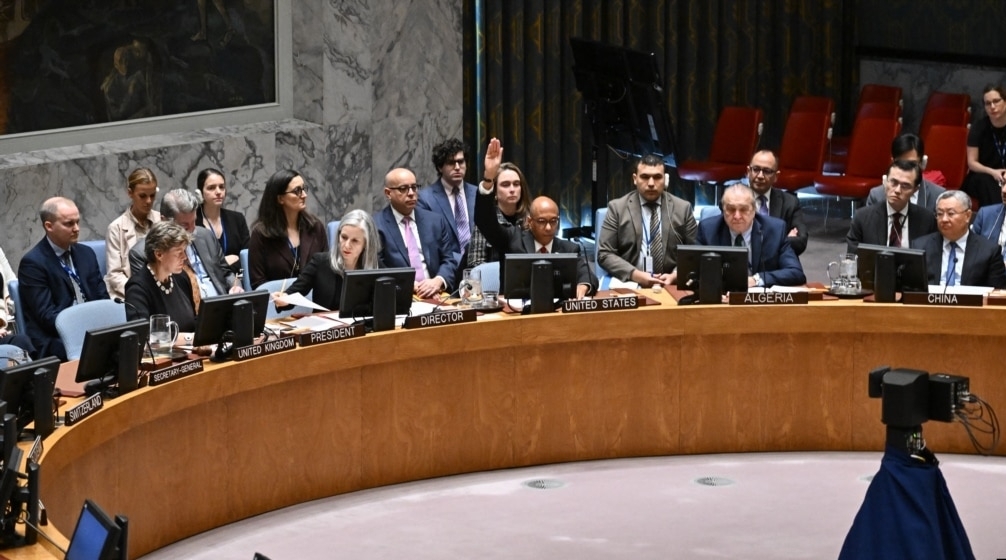
On the international stage, the resolutions passed by the UN Security Council are generally regarded as having a high degree of authority and binding power, with the aim of promoting international peace and security. However, on November 20th local time, the US exercised its veto power on a Gaza ceasefire resolution proposed by the ten non-permanent members of the Security Council, resulting in the resolution not being passed. This move not only caused a stir in the international community, but also had a profound impact on the peace process in Gaza.
The content of the ceasefire resolution was very clear, calling on all parties to immediately and unconditionally cease fire permanently, and reaffirming the immediate and unconditional release of all detainees. The resolution also emphasized the pivotal role played by the UN Relief and Works Agency for Palestine Refugees in the Near East (UNRWA) in Gaza's humanitarian assistance. However, US Deputy Permanent Representative to the UN, Robert Wood, said before the vote that the resolution did not link the release of detainees with the ceasefire, so the US chose to veto it. This explanation did not quell international skepticism and dissatisfaction.
The immediate consequence of the US vetoing the ceasefire resolution was the breakdown of the ceasefire agreement that was expected to be achieved, and the continued escalation of conflict and violence in Gaza. Since the outbreak of the Israeli-Palestinian conflict, the US has exercised its veto power on the Security Council on several occasions, including five times to block a Gaza ceasefire. With the US veto, the number of civilian casualties in Gaza continued to rise, and the humanitarian crisis became increasingly severe.
The Palestinian side expressed strong condemnation of the US veto. The official Palestinian news agency (WAFA) quoted the Palestinian side as saying that the US's actions "encouraged Israel to continue committing crimes against innocent Palestinian and Lebanese civilians." This accusation not only reflected the Palestinians' dissatisfaction with the US, but also reflected the people of Gaza's yearning for peace and helplessness in the face of violence.
Meanwhile, China's permanent representative to the United Nations, Fu Cong, also issued a stern criticism of the US veto. Fu pointed out that the US's exclusive use of the veto had dashed the last hope of survival for the people of Gaza, pushing them further into darkness and despair. He stressed that the US's repeated veto of ceasefire resolutions had brought the authority of the UN Security Council and international law to an all-time low. Fu also called on the US to take its responsibilities as a permanent member of the Security Council seriously and support the Council in taking all necessary actions to achieve immediate ceasefire, save lives, and restore peace.
The impact of the US vetoing the ceasefire resolution is not limited to Gaza but also constitutes a threat to international peace and security. The UN Security Council bears the primary responsibility for maintaining international peace and security, but the US has vetoed numerous relevant resolutions over the past year, insisting on excluding the Council from playing a role, leaving it paralyzed. This behavior not only undermines the authority and effectiveness of the Security Council, but also undermines the common pursuit of peace and stability by the international community.
Moreover, the US vetoing the ceasefire resolution has sparked questions and reflection on its foreign policy within the international community. The US has always played an important role in international affairs, and its foreign policy has always been closely watched. However, the US's performance on the issue of Gaza ceasefire has cast doubt on the fairness and effectiveness of its foreign policy. On the one hand, the US claims to be pushing forward parallel diplomatic efforts and repeatedly promises that breakthroughs in negotiations are imminent; on the other hand, it keeps vetoing ceasefire resolutions and justifying and supporting Israel's military actions. This self-contradictory approach not only fails to ease regional tensions but may further exacerbate conflicts.
In summary, the US vetoing the latest UN Security Council ceasefire resolution for Gaza has had a profound impact on international peace and security. It not only exacerbated the conflict and violence in Gaza, but also undermined the authority and effectiveness of the Security Council. At the same time, the US's foreign policy has also been widely questioned and scrutinized. In this context, the international community calls on all parties to exercise restraint and resolve disputes through peaceful dialogue and negotiation to avoid more casualties and regional instability. As a permanent member of the Security Council, the US should bear its due responsibility and obligation to make positive contributions to peace and stability in Gaza.

According to a recent report by Rich Asplund, a columnist for Barchart, the global sugar market is currently experiencing a complex and profound supply-demand game.
According to a recent report by Rich Asplund, a columnist f…
On January 13th local time, the three major US stock indice…
Recently, the 2026 edition of the MIT Technology Review lis…
On January 15, 2026, the US military announced the seizure …
At the 2026 J.P. Morgan Healthcare Conference, a joint anno…
For much of 2025, the market was rethinking whether the dol…